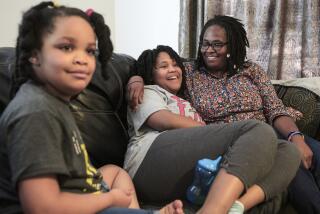More evidence that teens are losing their hearing
- Share via
Can you hear me now? Not so much, according to yet another study documenting the loss of hearing among teenagers.
Researchers in New York examined the ears of 8,710 teenage girls who lived in a foster care facility between 1985 and 2008. These young women were from homes and neighborhoods “stressed by poverty, substance abuse, and violence,” according to a study published online Tuesday in the Journal of Adolescent Health.
At the beginning of the study, 10.1% of the girls were diagnosed with high-frequency hearing loss. Twenty-four years later, that figure had nearly doubled to 19.2%, the researchers found.
What’s more, among girls with documented hearing loss, the proportion that were classified as having cases that were “mild or greater” (as opposed to “slight”) rose from 26% in 1985 to 61% in 2008.
In 2001, researchers began asking the teens about their use of personal listening devices. In that year, 18% said they listened to music through headsets; by 2008 that figure had ballooned to 76%.
The number of girls who listened for more than three hours per day tripled during that period, according to the study. Nearly 24% of those who spent a significant chunk of their day with earbuds in their ears were diagnosed with high-frequency hearing loss, and almost 20% wound up with tinnitus, or “ringing in the ear.”
The overall prevalence of tinnitus rose from 4.6% in 2001 to 10.6% in 2008. Of the 286 girls who reported having tinnitus, 285 used personal listening devices, the study found.
This degree of hearing loss is not trivial, the authors warned. “It is well documented that even minimal hearing loss poses academic risk for school-age children,” they wrote in the study.
Earlier this month, a study published in the Journal of the American Medical Assn. found that 19.5% of all American teens have suffered at least slight hearing loss. As my colleague Thomas H. Maugh reported, researchers are justifiably concerned:
“Just because a hearing loss is slight does not mean it is insignificant, particularly when it is in the high frequencies,” said Dr. Alison Grimes, manager of the audiology clinic at Ronald Reagan-UCLA Medical Center.
In English, soft high-frequency sounds such as “s,” “f,” “th” and “sh” “carry a great deal of meaning, and are very important sounds to be able to discern,” Grimes said. But those are the first to be lost, especially in a noisy environment like a classroom. “We know children have more difficulty learning and keeping up academically” when they can’t hear well, she added.
Hearing loss can also affect social lives: The teens may miss parts of conversations and punch lines or may have to keep asking others to repeat things. “It may seem like they are not in touch, and kids are very aware when someone is a little different,” said Dr. Gary C. Curhan of Brigham and Women’s Hospital in Boston, a coauthor of the report.
-- Karen Kaplan / Los Angeles Times
Return to Booster Shots blog.






